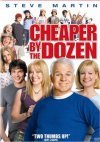BUY THE DVD:
|


|
|
|
SYNOPSIS:
| |
a man with twelve children gets a job in a big city and moves his family to the busy metropolis against his childrens' wishes.
|
|
|
MOVIE FACT:
| |
the film is based upon a book written in the 1940's by one of the real-life gilbreth children.
|
|
|
RATING:
|


two out of four possible stars
|
|
|
|
While fans of the original 1950 version of Cheaper by the Dozen might gasp at such a well-made film being remade, one must keep in mind that this new 2003 version was made for audiences of today, and that the focus of the film has shifted to accommodate present-day audiences. Seemingly focused on the scatterbrained antics of the family oriented comedies made popular by such actors as Eddie Murphy and Steve Martin (the last of which happens to be the star of this film), it isn't always what the actors say that elicits a few laughs from viewers as what those actors do. So-called "physical comedy" can be a blast and when it involves Steve Martin, as it does in Cheaper by the Dozen, the jokes are usually entertaining (due mostly to Martin's impressive facial distortion abilities).
The idea and premise has been "dumbed down" for the apparently less-savvy audiences of today (though one might argue that audiences today are more savvy, so this long-standing trend in the evolution of filmmaking is disturbing), but the lessons learned by the characters appear to be beneficial for the youngest members of the audiences. The theme on the importance of family and the idea of familial cooperation is present throughout the entire film, and the genuine nature of all of the characters is appropriate for even the youngest viewers. But rather than try to please all members of the audience, the most fun in the theater will be had by children under about ten years of age.
Bodily function jokes, sloppy jokes (the kind that involve various types of spilled food, vomit, and other potentially messy substances), and physical altercation jokes (where a character might fall, crash, or bang into something in a humorous way) are the standard comedic mechanisms used in this film and aside from some phrases uttered by characters at various off-hand moments, the laughs in the film usually result from the physical ouches and yelps of the characters. And though some of the stunts will garner a laugh from more than just the “under ten set,” it seems like the screenwriters could have made the more serious sequences in the film more emotional. When it crosses over the line into the arena of drama, the emotions presented by the characters aren't always intense enough.
Though the film's main purpose is obviously the comedy, the film too often goes soft in its approach to the more meaningful scenes. Sometimes, pumping up the velocity of the dramatic scenes can bring the added benefit of making the jokes in the film more deserving of audience laughter, and that tactic probably would have benefited this film. Given Steve Martin's supreme comedic abilities, it's probably too harsh to label this film as an event more at home in the world of television (though the video and DVD sales on this film should be impressive as films of this slant usually are), but the fact remains that the film needs more bite from start to finish. There are glimpses of true hilarity here and there, but the film is too soft in areas of both drama and comedy.
The large cast necessary for this film doesn't allow for any one story-line to emerge as dominant, though Ashton Kutcher's small role as a rookie actor (who has just landed his first commercial) stands out as one of the funniest in the film. Kutcher's delivery is ninety percent of his appeal as this character and he plays the part almost too well (uttering a few phrases over the course of the film that seem so honest that they might be mistaken for being autobiographical).
Supporting actors Hillary Duff and Tom Welling should each garner an audience from their teen fan-base and both do as well as they are probably able with their limited dialogue. The dialogue said by each character is rather thin across the board (excepting lead Martin), so each actor has but a limited amount of time in which to make an impression. The score of younger actors who play the roles of Steve Martin's twelve children (with the always lovely Bonnie Hunt playing his wife), each surprisingly emerge as individuals away from the pack, probably due to the great differences in temperament between each character.
From a sensitive son to a tomboy daughter, each child has his or her "quirk." Eldest daughter "Nora," played by Piper Perabo, has one of the most interesting (though somewhat under-used) stories in the film, and Perabo makes her character quite likeable charming. Adult actors Martin and Hunt also have a pleasing amount of chemistry with one another in their roles as man and wife, though it would have been refreshing to see some additional or more intense conflict to permeate the story through their characters.
Allowing the focus of the film to remain solely on the characters, elements such as cinematography, score, and editing service the film well as the actors will always be in the forefront of the audience's attention. Which is probably a good thing given the rather large cast this film boasts. Though the film should have been more extreme on all fronts (from the drama and the comedy to the arguments and the slapstick jokes) as innocent family entertainment, this film succeeds. Don't attend this film expecting the comedy to simply fall in your lap at every turn, and you just might leave the theater satisfied with what amounts to a light cinematic diversion.
Review by Kelsey Wyatt.
| |
|